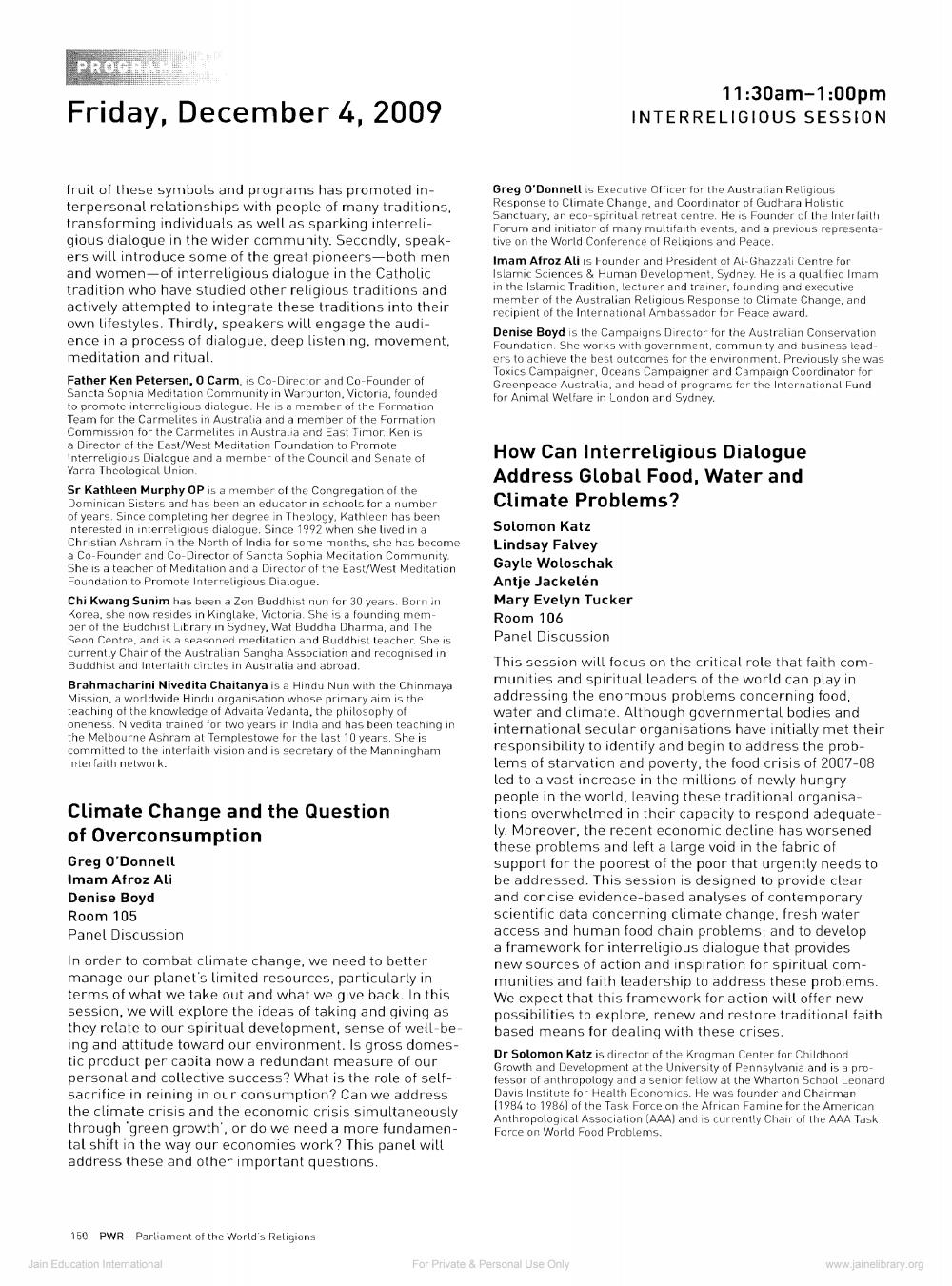________________
PROGRAM Friday, December 4, 2009
11:30am-1:00pm INTERRELIGIOUS SESSION
Greg O'Donnell is Executive Officer for the Australian Religious Response to Climate Change, and coordinator of Gudhara Holistic Sanctuary, an eco-spiritual retreat centre. He is Founder of the Inter laith Forum and initiator of many multifaith events, and a previous representa tive on the World Conference of Religions and Peace. Imam Afroz Ali is Founder and President of Al-Ghazzali Centre for Islamic Sciences & Human Development, Sydney. He is a qualified Imam in the Islamic Tradition, lecturer and trainer, founding and executive member of the Australian Religious Response to Climate Change, and recipient of the International Ambassador for Peace award. Denise Boyd is the Campaigns Director for the Australian Conservation Foundation. She works with government, Community and business lead ers to achieve the best outcomes for the environment. Previously she was Toxics Campaigner, Oceans Campaigner and Campaign Coordinator for Greenpeace Australia, and head of programs for the International Fund for Animal Welfare in London and Sydney.
fruit of these symbols and programs has promoted in terpersonal relationships with people of many traditions, transforming individuals as well as sparking interreligious dialogue in the wider community. Secondly, speakers will introduce some of the great pioneers-both men and women-of interreligious dialogue in the Catholic tradition who have studied other religious traditions and actively attempted to integrate these traditions into their own lifestyles. Thirdly, speakers will engage the audience in a process of dialogue, deep listening, movement, meditation and ritual. Father Ken Petersen, 0 Carm, is Co-Director and Co-Founder of Sancta Sophia Meditation Community in Warburton, Victoria, founded to promote interreligious dialogue. He is a member of the Formation Team for the Carmelites in Australia and a member of the formation Commission for the Carmelites in Australia and East Timor Ken is a Director of the East/West Meditation Foundation to Promote interreligious Dialogue and a member of the Council and Senate of Yarra Thcological Union. Sr Kathleen Murphy OP is a member of the Congregation of the Dominican Sisters and has been an educator in schools for a number of years. Since completing her degree in Theology, Kathleen has been interested in interreligious dialogue. Since 1992 when she lived in a Christian Ashram in the North of India for some months, she has become a Co-Founder and Co-Director of Sancta Sophia Meditation Community She is a teacher of Meditation and a Director of the East/West Meditation Foundation to Promote Interreligious Dialogue. Chi Kwang Sunim has been a Zen Buddhist nun for 30 years. Born in Korea, she now resides in Kinglake, Victoria. She is a founding member of the Buddhist Library in Sydney. Wat Buddha Dharma, and The Seon Centre, and is a seasoned meditation and Buddhist teacher. She is currently Chair of the Australian Sangha Association and recognised in Buddhist and Interfaith circles in Australia and abroad. Brahmacharini Nivedita Chaitanya is a Hindu Nun with the Chinmaya Mission, a worldwide Hindu organisation whose primary aim is the teaching of the knowledge of Advaita Vedanta, the philosophy of oneness. Nivedita trained for two years in India and has been teaching in the Melbourne Ashram at Templestowe for the last 10 years. She is committed to the interfaith vision and is secretary of the Manningham Interfaith network.
How Can Interreligious Dialogue Address Global Food, Water and Climate Problems? Solomon Katz Lindsay Falvey Gayle Woloschak Antje Jackelén Mary Evelyn Tucker Room 106 Panel Discussion This session will focus on the critical role that faith communities and spiritual leaders of the world can play in addressing the enormous problems concerning food, water and climate. Although governmental bodies and international secular organisations have initially met their responsibility to identify and begin to address the problems of starvation and poverty, the food crisis of 2007-08 led to a vast increase in the millions of newly hungry people in the world, leaving these traditional organisations overwhelmed in their capacity to respond adequately. Moreover, the recent economic decline has worsened these problems and left a large void in the fabric of support for the poorest of the poor that urgently needs to be addressed. This session is designed to provide clear and concise evidence-based analyses of contemporary scientific data concerning climate change, fresh water access and human food chain problems; and to develop a framework for interreligious dialogue that provides new sources of action and inspiration for spiritual communities and faith leadership to address these problems. We expect that this framework for action will offer new possibilities to explore, renew and restore traditional faith based means for dealing with these crises. Dr Solomon Katz is director of the Krogman Center for Childhood Growth and Development at the University of Pennsylvania and is a professor of anthropology and a senior fellow at the Wharton School Leonard Davis Institute for Health Economics. He was founder and Chairman (1984 to 1986) of the Task Force on the African Famine for the American Anthropological Association (AAA) and is currently Chair of the AAA Task Force on World Food Problems.
Climate Change and the Question of Overconsumption Greg O'Donnell Imam Afroz Ali Denise Boyd Room 105 Panel Discussion In order to combat climate change, we need to better manage our planet's limited resources, particularly in terms of what we take out and what we give back. In this session, we will explore the ideas of taking and giving as they relate to our spiritual development, sense of well-be ing and attitude toward our environment. Is gross domestic product per capita now a redundant measure of our personal and collective success? What is the role of selfsacrifice in reining in our consumption? Can we address the climate crisis and the economic crisis simultaneously through 'green growth, or do we need a more fundamental shift in the way our economies work? This panel will address these and other important questions.
150 PWR - Parliament of the World's Religions
Jain Education International
For Private & Personal Use Only
www.jainelibrary.org




